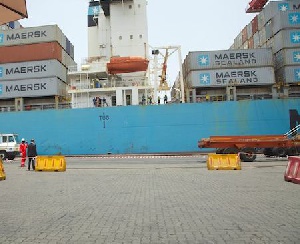Business News of Monday, 8 September 2014
Source: New Crusading Guide
Importers to pay more charges...
Ghanaians must brace themselves up to fork out more money to purchase imported goods as the Ghana Standards Authority (GSA) will from October 1, 2014 introduce its own set of rules and regulations for the assessment of all products and services and charge their own fees even though the Food and Drugs Authority (FDA) is already doing the same.
Information reaching The New Crusading GUIDE has it that the GSA has entered into a contract with the local representatives of Societe Generale de Surveillance (SGS) to carry out pre-shipment inspection at a cost to the consumer even though there are Destination Inspection Companies (DICs) who are already doing the inspection at a cost.
The FDA also recently introduced a new regulation that requires all suppliers of goods to pay a fee of Twenty Thousand US Dollars (USD20, 000) so that representatives of FDA can travel to the countries of origin of the goods for inspection.
Indeed Ghana by law abandoned the Pre-Shipment inspection of goods in the 1990’s and introduced Destination Inspection Companies (DICs) with Scanners at all ports to carry out the inspection and assessment of goods for a fee. The DICs are currently five in number.
And now the GSA has also contracted a new company to do pre-shipment at the countries of origin of these same goods. So now Ghana will have two of its institutions doing pre-shipment of goods and then at the ports here in Ghana the DICs will do the third inspection of the same goods all at a cost to the consumer. The GSA Pre-Shipment Contract, according to industry players gives monopoly to SGS.
According to documents sighted by The New Crusading GUIDE, the GSA will charge several fees in the pre-shipment exercise. Some of them are; verification fees of 200 to 300 hundred dollars and registration fees of US$ 375 and US$300 per inspection of used vehicles.
All these fees will be payable in advance and shall be paid regardless of whether after the assessment of the goods the shipment does not qualify for the conformity certificate or even if the exporter decides to abandon the shipment.
The turf war between the GSA and FDA has reached its zenith and the two are bent on aggravating the already high cost of living that many Ghanaians are experiencing.
“If they charge US$1000 per a car, I will still do my business because I will just pass it on to the buyer. However, I believe strongly that it is a bad move, and it should be stopped," a Tema-based used vehicle dealer told this reporter yesterday.
Officials of both institutions were not immediately available for clarification since it was a weekend.
Even though the Parliament of Ghana has not passed the new policy, the GSA is in a hurry to kick-start the policy this October.
According to him, no education has been done on the policy, and nobody knows the category of goods and services that will be affected and yet the GSA was pushing to implement the policy. He opined that small-scale importers like women traders who travel to China and Dubai to import goods will be thrown out of business if the new GSA policy is allowed to come into force.
The duplication of duties by Ghanaian Agencies at the ports is suffocating businesses, but it appears no one cares to streamline the process. The Environmental Protection Agency (EPA), the Food and Drugs Board (FDA) the Ghana Standards Authority (GSA) and the Port Health are all at the ports duplicating each others’ roles and charging fees to the discomfort of the consumer. All these Agencies have the same guidelines for the establishment of food Industries or for the registration of prepackaged foods.
Some of them have even succeeded in introducing new fees and charges without recourse to the Parliament of Ghana under the guise that they are semi-autonomous organizations.











